Kant's Utilitarianism: Principle, Comparison, and Philosophical Views
VerifiedAdded on 2020/10/22
|6
|1251
|444
Essay
AI Summary
This essay provides a comprehensive analysis of Immanuel Kant's utilitarianism principle, exploring its core tenets and comparing it with the philosophical viewpoints of other prominent thinkers such as Mill, Ross, and Sidgwick. The essay delves into Kant's deontological approach, emphasizing the significance of intentions, maxims, and categorical imperatives in moral decision-making. It contrasts Kant's emphasis on duty and universal moral laws with the utilitarian focus on maximizing happiness. The essay also discusses the similarities and differences between Kant and Mill, highlighting their shared commitment to morality while acknowledging their distinct approaches. Furthermore, it examines the criticisms of Kant's theory by philosophers like Ross and Sidgwick, offering a balanced perspective on the strengths and limitations of his ethical framework. Ultimately, the essay argues for the preference of Kant's principles based on their systematic approach, emphasis on moral duties, and the importance of not making exceptions for oneself. The essay provides an in-depth understanding of Kant's utilitarianism and its place within the broader context of moral philosophy.
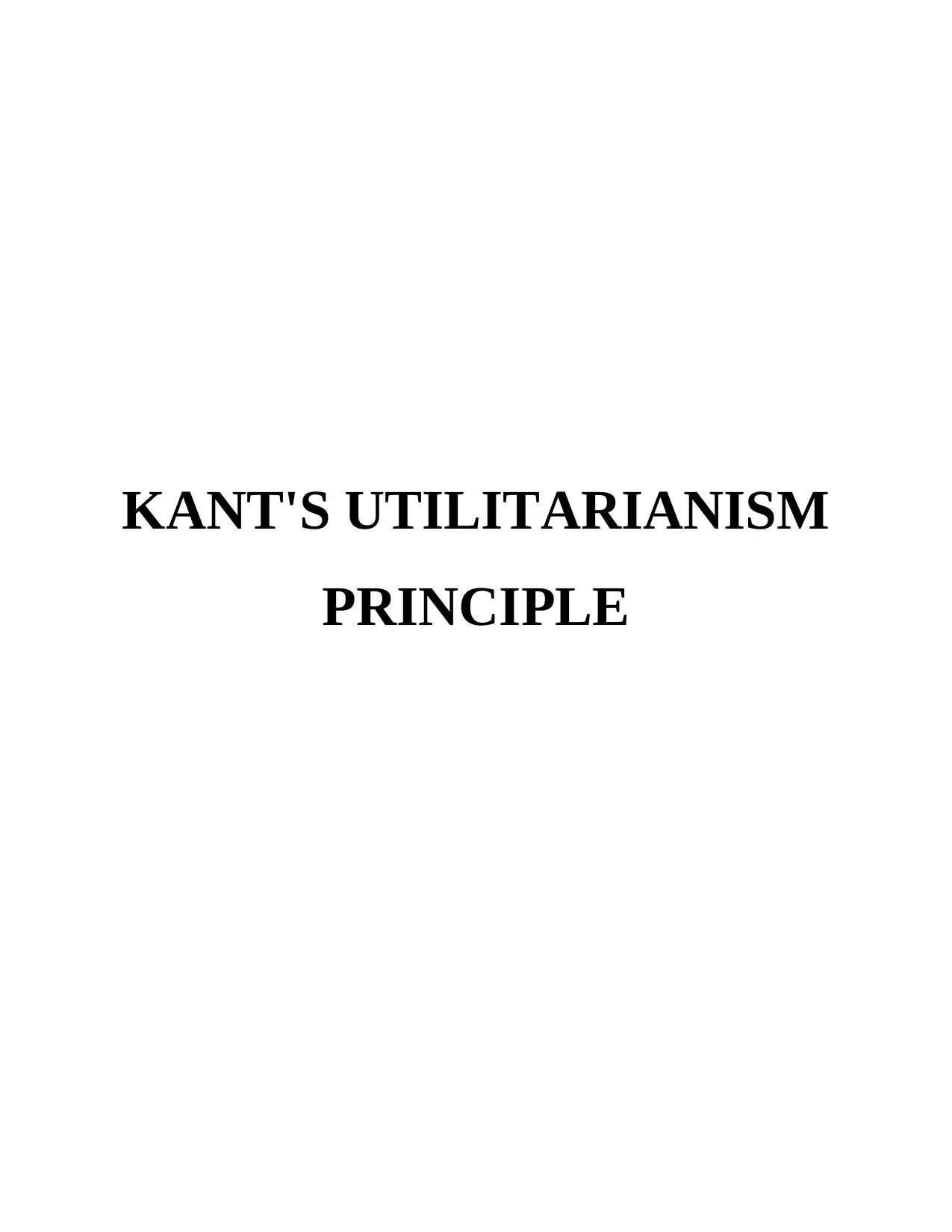
KANT'S UTILITARIANISM
PRINCIPLE
PRINCIPLE
Paraphrase This Document
Need a fresh take? Get an instant paraphrase of this document with our AI Paraphraser
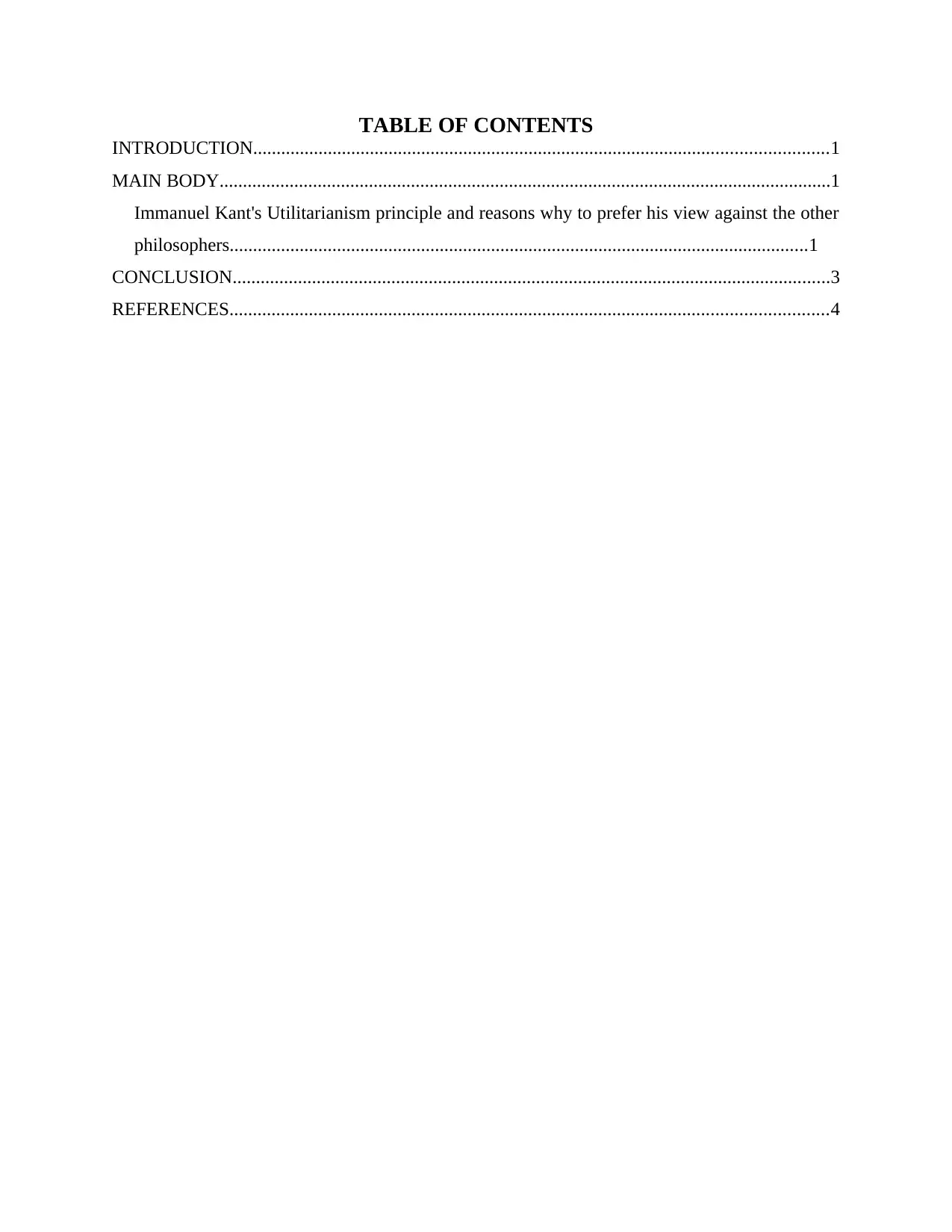
TABLE OF CONTENTS
INTRODUCTION...........................................................................................................................1
MAIN BODY...................................................................................................................................1
Immanuel Kant's Utilitarianism principle and reasons why to prefer his view against the other
philosophers............................................................................................................................1
CONCLUSION................................................................................................................................3
REFERENCES................................................................................................................................4
INTRODUCTION...........................................................................................................................1
MAIN BODY...................................................................................................................................1
Immanuel Kant's Utilitarianism principle and reasons why to prefer his view against the other
philosophers............................................................................................................................1
CONCLUSION................................................................................................................................3
REFERENCES................................................................................................................................4
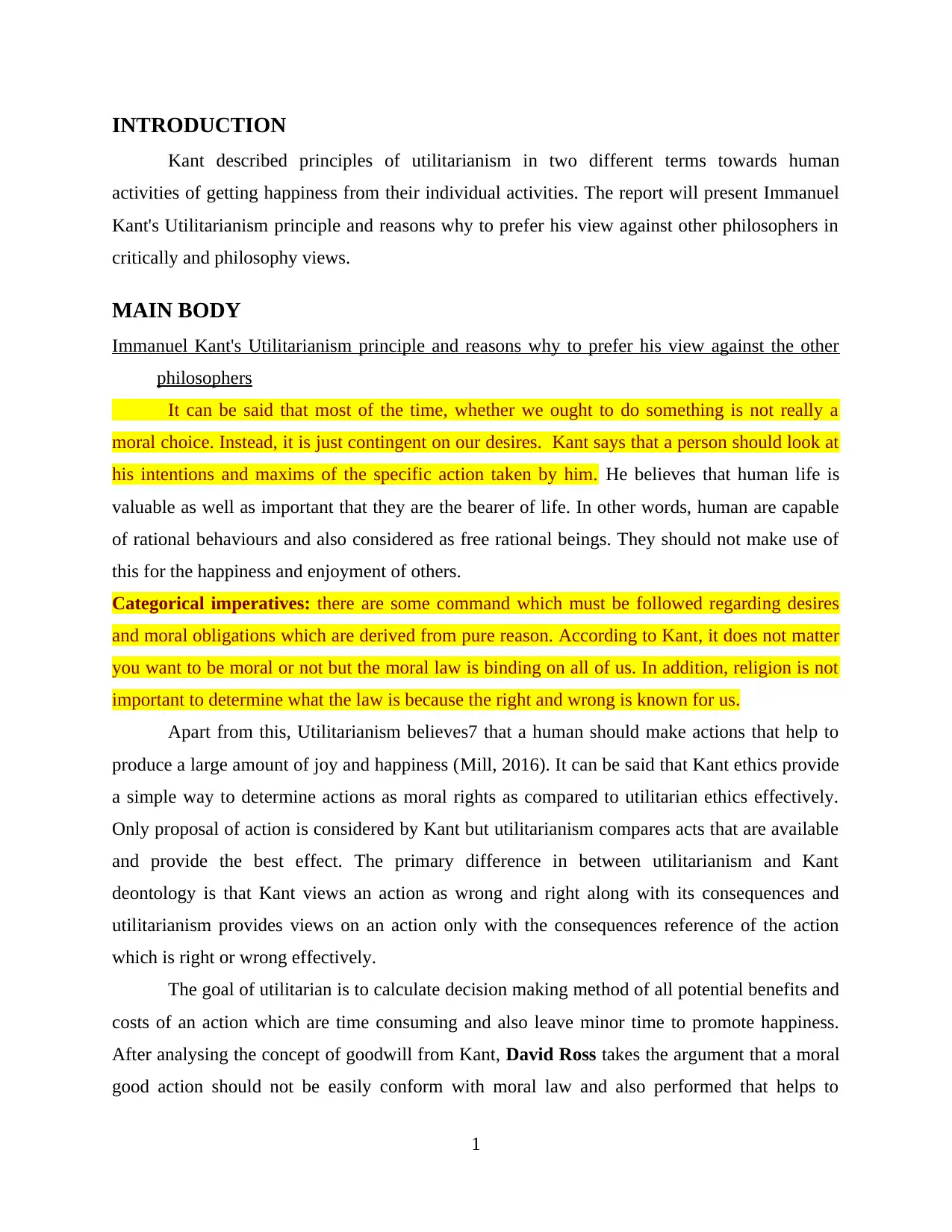
INTRODUCTION
Kant described principles of utilitarianism in two different terms towards human
activities of getting happiness from their individual activities. The report will present Immanuel
Kant's Utilitarianism principle and reasons why to prefer his view against other philosophers in
critically and philosophy views.
MAIN BODY
Immanuel Kant's Utilitarianism principle and reasons why to prefer his view against the other
philosophers
It can be said that most of the time, whether we ought to do something is not really a
moral choice. Instead, it is just contingent on our desires. Kant says that a person should look at
his intentions and maxims of the specific action taken by him. He believes that human life is
valuable as well as important that they are the bearer of life. In other words, human are capable
of rational behaviours and also considered as free rational beings. They should not make use of
this for the happiness and enjoyment of others.
Categorical imperatives: there are some command which must be followed regarding desires
and moral obligations which are derived from pure reason. According to Kant, it does not matter
you want to be moral or not but the moral law is binding on all of us. In addition, religion is not
important to determine what the law is because the right and wrong is known for us.
Apart from this, Utilitarianism believes7 that a human should make actions that help to
produce a large amount of joy and happiness (Mill, 2016). It can be said that Kant ethics provide
a simple way to determine actions as moral rights as compared to utilitarian ethics effectively.
Only proposal of action is considered by Kant but utilitarianism compares acts that are available
and provide the best effect. The primary difference in between utilitarianism and Kant
deontology is that Kant views an action as wrong and right along with its consequences and
utilitarianism provides views on an action only with the consequences reference of the action
which is right or wrong effectively.
The goal of utilitarian is to calculate decision making method of all potential benefits and
costs of an action which are time consuming and also leave minor time to promote happiness.
After analysing the concept of goodwill from Kant, David Ross takes the argument that a moral
good action should not be easily conform with moral law and also performed that helps to
1
Kant described principles of utilitarianism in two different terms towards human
activities of getting happiness from their individual activities. The report will present Immanuel
Kant's Utilitarianism principle and reasons why to prefer his view against other philosophers in
critically and philosophy views.
MAIN BODY
Immanuel Kant's Utilitarianism principle and reasons why to prefer his view against the other
philosophers
It can be said that most of the time, whether we ought to do something is not really a
moral choice. Instead, it is just contingent on our desires. Kant says that a person should look at
his intentions and maxims of the specific action taken by him. He believes that human life is
valuable as well as important that they are the bearer of life. In other words, human are capable
of rational behaviours and also considered as free rational beings. They should not make use of
this for the happiness and enjoyment of others.
Categorical imperatives: there are some command which must be followed regarding desires
and moral obligations which are derived from pure reason. According to Kant, it does not matter
you want to be moral or not but the moral law is binding on all of us. In addition, religion is not
important to determine what the law is because the right and wrong is known for us.
Apart from this, Utilitarianism believes7 that a human should make actions that help to
produce a large amount of joy and happiness (Mill, 2016). It can be said that Kant ethics provide
a simple way to determine actions as moral rights as compared to utilitarian ethics effectively.
Only proposal of action is considered by Kant but utilitarianism compares acts that are available
and provide the best effect. The primary difference in between utilitarianism and Kant
deontology is that Kant views an action as wrong and right along with its consequences and
utilitarianism provides views on an action only with the consequences reference of the action
which is right or wrong effectively.
The goal of utilitarian is to calculate decision making method of all potential benefits and
costs of an action which are time consuming and also leave minor time to promote happiness.
After analysing the concept of goodwill from Kant, David Ross takes the argument that a moral
good action should not be easily conform with moral law and also performed that helps to
1
⊘ This is a preview!⊘
Do you want full access?
Subscribe today to unlock all pages.

Trusted by 1+ million students worldwide
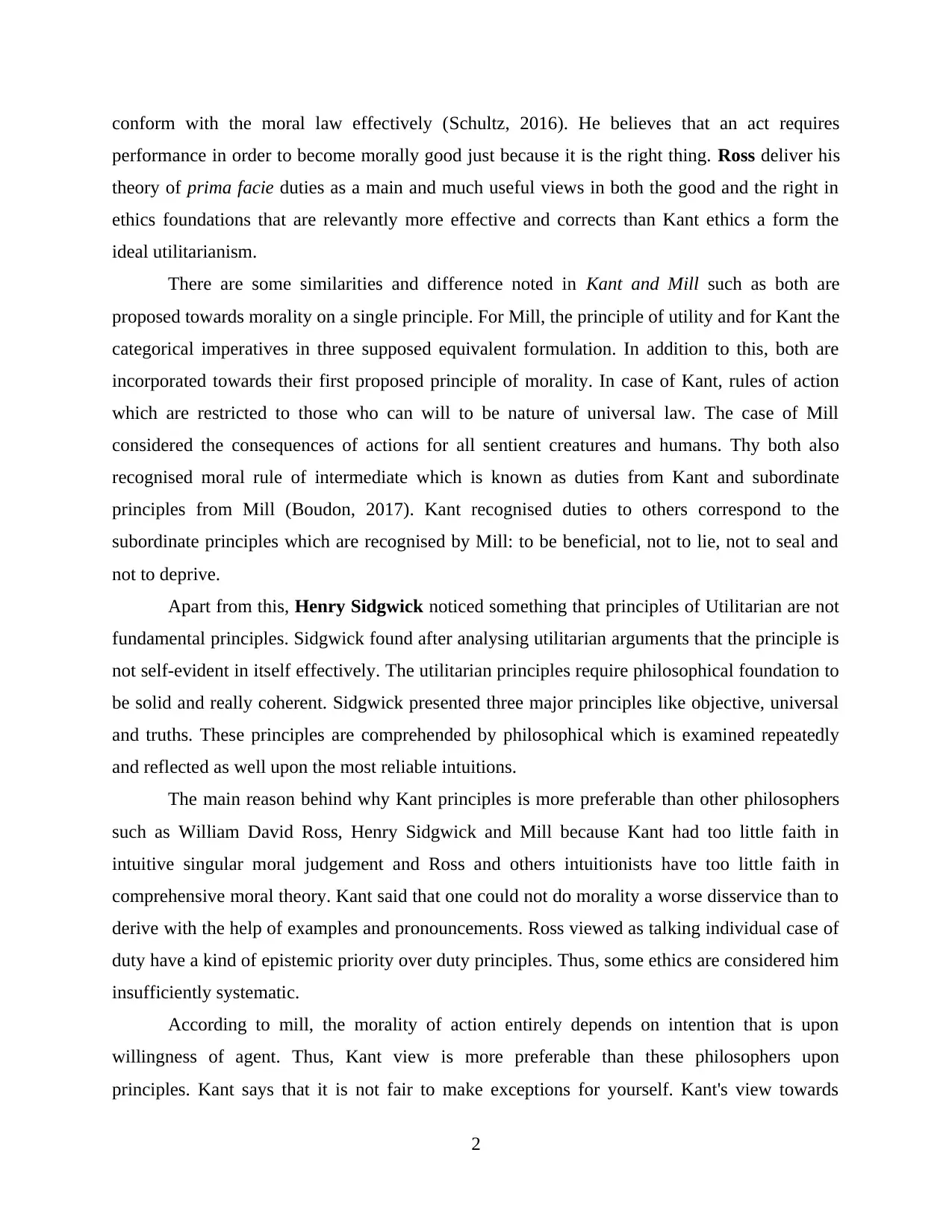
conform with the moral law effectively (Schultz, 2016). He believes that an act requires
performance in order to become morally good just because it is the right thing. Ross deliver his
theory of prima facie duties as a main and much useful views in both the good and the right in
ethics foundations that are relevantly more effective and corrects than Kant ethics a form the
ideal utilitarianism.
There are some similarities and difference noted in Kant and Mill such as both are
proposed towards morality on a single principle. For Mill, the principle of utility and for Kant the
categorical imperatives in three supposed equivalent formulation. In addition to this, both are
incorporated towards their first proposed principle of morality. In case of Kant, rules of action
which are restricted to those who can will to be nature of universal law. The case of Mill
considered the consequences of actions for all sentient creatures and humans. Thy both also
recognised moral rule of intermediate which is known as duties from Kant and subordinate
principles from Mill (Boudon, 2017). Kant recognised duties to others correspond to the
subordinate principles which are recognised by Mill: to be beneficial, not to lie, not to seal and
not to deprive.
Apart from this, Henry Sidgwick noticed something that principles of Utilitarian are not
fundamental principles. Sidgwick found after analysing utilitarian arguments that the principle is
not self-evident in itself effectively. The utilitarian principles require philosophical foundation to
be solid and really coherent. Sidgwick presented three major principles like objective, universal
and truths. These principles are comprehended by philosophical which is examined repeatedly
and reflected as well upon the most reliable intuitions.
The main reason behind why Kant principles is more preferable than other philosophers
such as William David Ross, Henry Sidgwick and Mill because Kant had too little faith in
intuitive singular moral judgement and Ross and others intuitionists have too little faith in
comprehensive moral theory. Kant said that one could not do morality a worse disservice than to
derive with the help of examples and pronouncements. Ross viewed as talking individual case of
duty have a kind of epistemic priority over duty principles. Thus, some ethics are considered him
insufficiently systematic.
According to mill, the morality of action entirely depends on intention that is upon
willingness of agent. Thus, Kant view is more preferable than these philosophers upon
principles. Kant says that it is not fair to make exceptions for yourself. Kant's view towards
2
performance in order to become morally good just because it is the right thing. Ross deliver his
theory of prima facie duties as a main and much useful views in both the good and the right in
ethics foundations that are relevantly more effective and corrects than Kant ethics a form the
ideal utilitarianism.
There are some similarities and difference noted in Kant and Mill such as both are
proposed towards morality on a single principle. For Mill, the principle of utility and for Kant the
categorical imperatives in three supposed equivalent formulation. In addition to this, both are
incorporated towards their first proposed principle of morality. In case of Kant, rules of action
which are restricted to those who can will to be nature of universal law. The case of Mill
considered the consequences of actions for all sentient creatures and humans. Thy both also
recognised moral rule of intermediate which is known as duties from Kant and subordinate
principles from Mill (Boudon, 2017). Kant recognised duties to others correspond to the
subordinate principles which are recognised by Mill: to be beneficial, not to lie, not to seal and
not to deprive.
Apart from this, Henry Sidgwick noticed something that principles of Utilitarian are not
fundamental principles. Sidgwick found after analysing utilitarian arguments that the principle is
not self-evident in itself effectively. The utilitarian principles require philosophical foundation to
be solid and really coherent. Sidgwick presented three major principles like objective, universal
and truths. These principles are comprehended by philosophical which is examined repeatedly
and reflected as well upon the most reliable intuitions.
The main reason behind why Kant principles is more preferable than other philosophers
such as William David Ross, Henry Sidgwick and Mill because Kant had too little faith in
intuitive singular moral judgement and Ross and others intuitionists have too little faith in
comprehensive moral theory. Kant said that one could not do morality a worse disservice than to
derive with the help of examples and pronouncements. Ross viewed as talking individual case of
duty have a kind of epistemic priority over duty principles. Thus, some ethics are considered him
insufficiently systematic.
According to mill, the morality of action entirely depends on intention that is upon
willingness of agent. Thus, Kant view is more preferable than these philosophers upon
principles. Kant says that it is not fair to make exceptions for yourself. Kant's view towards
2
Paraphrase This Document
Need a fresh take? Get an instant paraphrase of this document with our AI Paraphraser
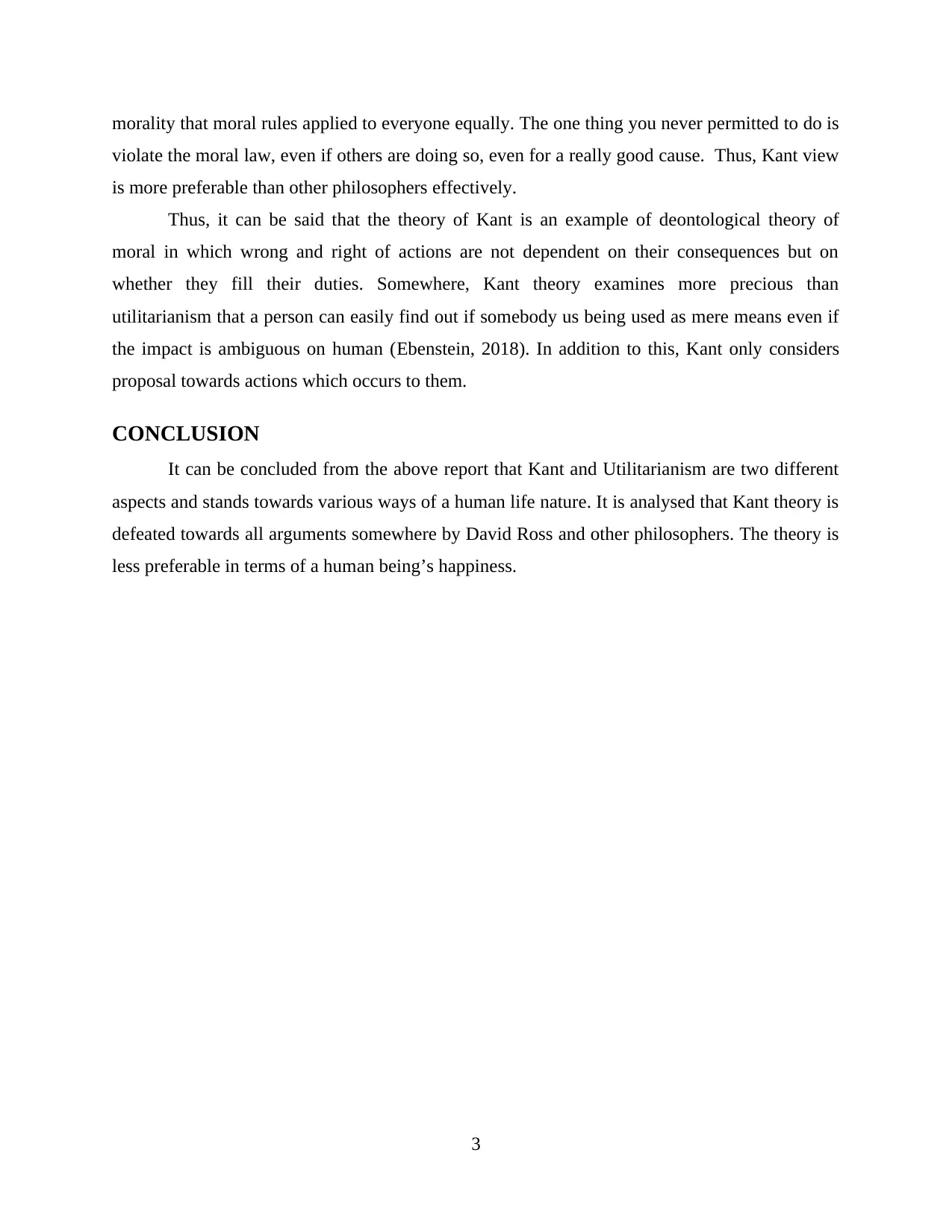
morality that moral rules applied to everyone equally. The one thing you never permitted to do is
violate the moral law, even if others are doing so, even for a really good cause. Thus, Kant view
is more preferable than other philosophers effectively.
Thus, it can be said that the theory of Kant is an example of deontological theory of
moral in which wrong and right of actions are not dependent on their consequences but on
whether they fill their duties. Somewhere, Kant theory examines more precious than
utilitarianism that a person can easily find out if somebody us being used as mere means even if
the impact is ambiguous on human (Ebenstein, 2018). In addition to this, Kant only considers
proposal towards actions which occurs to them.
CONCLUSION
It can be concluded from the above report that Kant and Utilitarianism are two different
aspects and stands towards various ways of a human life nature. It is analysed that Kant theory is
defeated towards all arguments somewhere by David Ross and other philosophers. The theory is
less preferable in terms of a human being’s happiness.
3
violate the moral law, even if others are doing so, even for a really good cause. Thus, Kant view
is more preferable than other philosophers effectively.
Thus, it can be said that the theory of Kant is an example of deontological theory of
moral in which wrong and right of actions are not dependent on their consequences but on
whether they fill their duties. Somewhere, Kant theory examines more precious than
utilitarianism that a person can easily find out if somebody us being used as mere means even if
the impact is ambiguous on human (Ebenstein, 2018). In addition to this, Kant only considers
proposal towards actions which occurs to them.
CONCLUSION
It can be concluded from the above report that Kant and Utilitarianism are two different
aspects and stands towards various ways of a human life nature. It is analysed that Kant theory is
defeated towards all arguments somewhere by David Ross and other philosophers. The theory is
less preferable in terms of a human being’s happiness.
3
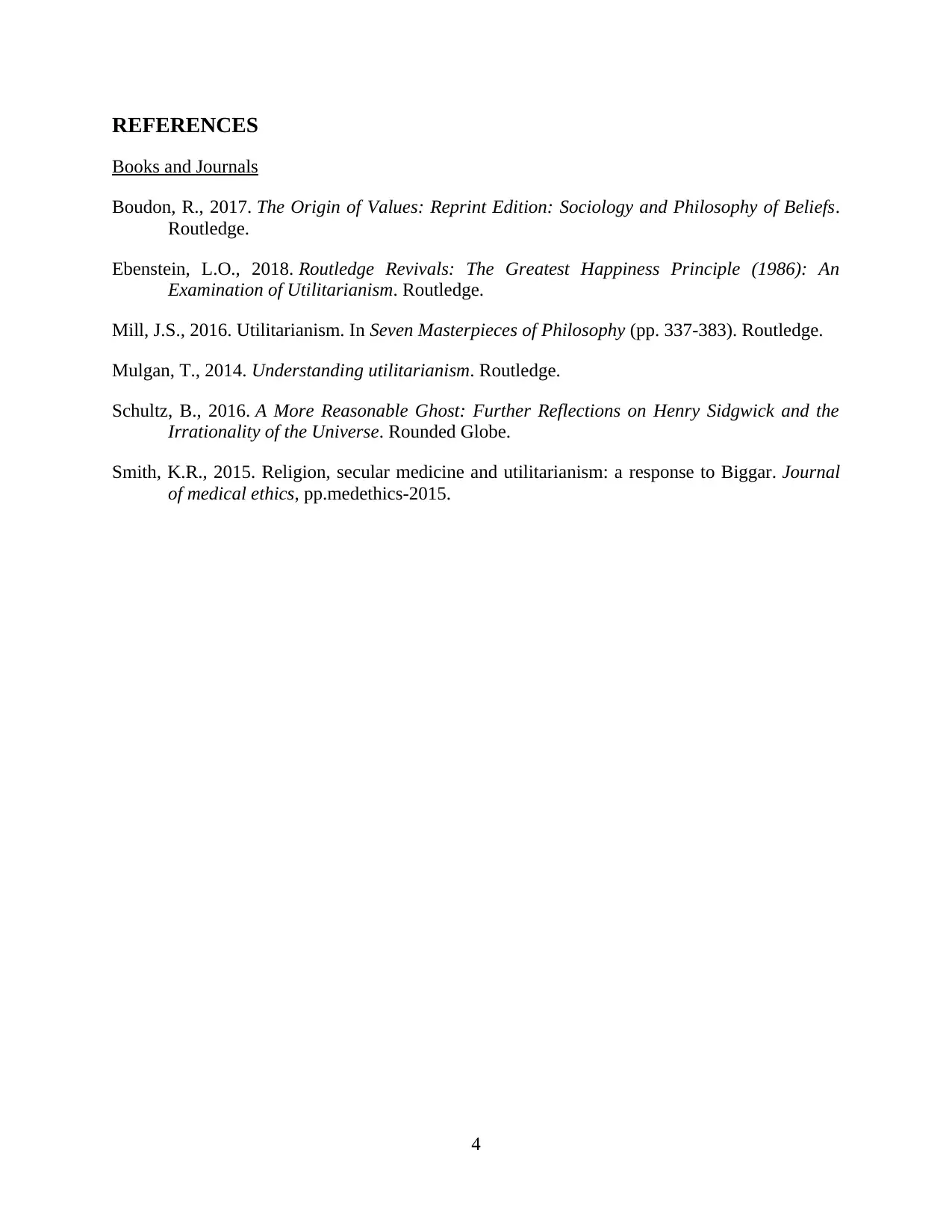
REFERENCES
Books and Journals
Boudon, R., 2017. The Origin of Values: Reprint Edition: Sociology and Philosophy of Beliefs.
Routledge.
Ebenstein, L.O., 2018. Routledge Revivals: The Greatest Happiness Principle (1986): An
Examination of Utilitarianism. Routledge.
Mill, J.S., 2016. Utilitarianism. In Seven Masterpieces of Philosophy (pp. 337-383). Routledge.
Mulgan, T., 2014. Understanding utilitarianism. Routledge.
Schultz, B., 2016. A More Reasonable Ghost: Further Reflections on Henry Sidgwick and the
Irrationality of the Universe. Rounded Globe.
Smith, K.R., 2015. Religion, secular medicine and utilitarianism: a response to Biggar. Journal
of medical ethics, pp.medethics-2015.
4
Books and Journals
Boudon, R., 2017. The Origin of Values: Reprint Edition: Sociology and Philosophy of Beliefs.
Routledge.
Ebenstein, L.O., 2018. Routledge Revivals: The Greatest Happiness Principle (1986): An
Examination of Utilitarianism. Routledge.
Mill, J.S., 2016. Utilitarianism. In Seven Masterpieces of Philosophy (pp. 337-383). Routledge.
Mulgan, T., 2014. Understanding utilitarianism. Routledge.
Schultz, B., 2016. A More Reasonable Ghost: Further Reflections on Henry Sidgwick and the
Irrationality of the Universe. Rounded Globe.
Smith, K.R., 2015. Religion, secular medicine and utilitarianism: a response to Biggar. Journal
of medical ethics, pp.medethics-2015.
4
⊘ This is a preview!⊘
Do you want full access?
Subscribe today to unlock all pages.

Trusted by 1+ million students worldwide
1 out of 6
Related Documents
Your All-in-One AI-Powered Toolkit for Academic Success.
+13062052269
info@desklib.com
Available 24*7 on WhatsApp / Email
![[object Object]](/_next/static/media/star-bottom.7253800d.svg)
Unlock your academic potential
Copyright © 2020–2026 A2Z Services. All Rights Reserved. Developed and managed by ZUCOL.





